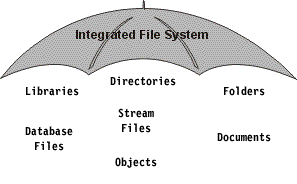What the integrated file system is
The integrated file system is a part of the i5/OS® operating system that supports stream input/output and storage management similar to personal computer and UNIX® operating systems, while providing an integrating structure over all information stored on your system.
The integrated file system comprises 11 file systems, each with their own set of logical structures and rules for interacting with information in storage.
The key features of the integrated file system are as follows:
- Support for storing information in stream files that can contain long continuous strings of data. These strings of data might be, for example,
the text of a document or the picture elements in a picture. The stream file support is designed for efficient use in client/server applications.
- A hierarchical directory structure that allows objects to be organized like fruit on the branches of a tree. You can access an object by specifying the path through the directory to the object.
- A common interface that enables users and applications to access not only the stream files but also database files, documents, and other objects that are stored on your system.
- A common view of stream files that are stored locally on your system, Integrated xSeries® Server for iSeries™, or a remote Windows NT® server. Stream files can also be stored remotely on a local area network (LAN) server, a Novell NetWare server, another remote System i™ product, or a Network File System (NFS) server.

Parent topic:
Overview of the integrated file system
Related concepts
File systems